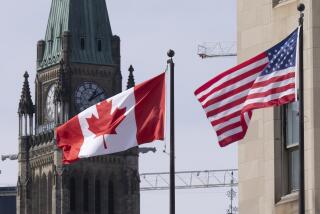Canada to Seek Total Ban on Tobacco Ads : Smoking: High court recently struck down previous restrictions. Tobacco council says it will resume campaigns.
- Share via
OTTAWA — Canada’s health minister announced Monday that the government will seek to ban all tobacco advertising, following a recent Supreme Court ruling that stuck down a law sharply restricting tobacco ads.
The minister, Diane Marleau, said details of her proposal will be worked out in early 1996 during consultations with provincial governments, the health community and tobacco manufacturers.
“We will not permit the marketing and sale of a product that kills so many Canadians to go unregulated,” Marleau said at a news conference. “Tobacco products are like no other. They are highly addictive, they are hazardous, and they are lethal in their consequences.”
The Supreme Court said in a surprise ruling in September that Canada’s partial ban on tobacco advertising violated the right to freedom of speech.
However, Marleau said the government believes it has now gathered sufficient health evidence to justify an even tougher prohibition. Asked what exceptions she might allow, Marleau replied: “If it were up to me, none. . . . What we’re going to try to get is a total ban on advertising.”
Shortly after the announcement, the Canadian Tobacco Manufacturers Council said it is time to abandon its 3-month-old, self-imposed ban on advertising. It will now proceed with a new ad campaign using its own set of rules, which will be made public as early as next week, it said.
“This isn’t a challenge to the minister,” Marie-Josee Lapointe, a council spokeswoman, said. “It’s just a question of good sense. We won the Supreme Court decision to communicate with our clients.”
Robert Parker, president of the tobacco makers group, said the government’s proposal “would appear to go beyond the court ruling.” He added that “an initial reaction is that it doesn’t appear to be possible under the law.”
“We are very disappointed that [Marleau has] chosen to go this route,” said Mary Trudelle, spokeswoman for RJR Macdonald Inc., a unit of RJR Nabisco Holdings Corp. RJR has about 16% of the Canadian cigarette market.
“It seems to be totally contradictory to the decision of the Supreme Court,” she said. She called on lawmakers to “give [the voluntary code] a chance to work before they push for . . . draconian legislation.”
Still, the U.S. cigarette division of RJR Nabisco suggested that their ads might not even make a difference. An independent study in 1993 of 22 countries where tobacco advertisements had been banned found that consumption did not always decline, it said.
“In some of the countries, it actually picked up,” R.J. Reynolds spokeswoman Peggy Carter said. “The evidence is overwhelming that it’s driven by peer influence.”
There was no comment from the other Canadian tobacco makers, Imasco Ltd.’s Imperial Tobacco Ltd. and Rothmans Benson & Hedges Inc., which is 40%-owned by Philip Morris Co.
The law struck down in September had banned tobacco advertising in the media but permitted tobacco companies to sponsor arts and cultural events.
Marleau’s new proposals would set ground rules on sponsorship involving tobacco products, including restrictions on how such sponsorships may be promoted. Sponsorships have been a prime vehicle for tobacco brand-name promotion in recent years.
Anti-smoking groups have denounced them as a mockery of the advertising ban.
Marleau’s proposal would also restrict tobacco endorsements by celebrities and athletes, ban in-store tobacco displays and mail-order sales to reduce smoking among the young, and toughen packaging and labeling requirements to prevent false or misleading claims.
More to Read
Sign up for Essential California
The most important California stories and recommendations in your inbox every morning.
You may occasionally receive promotional content from the Los Angeles Times.













